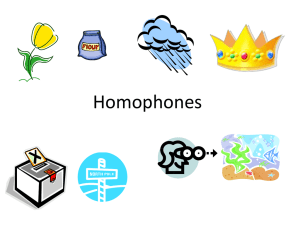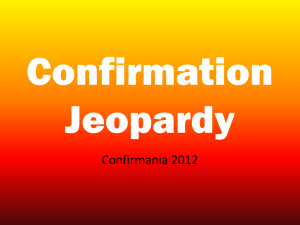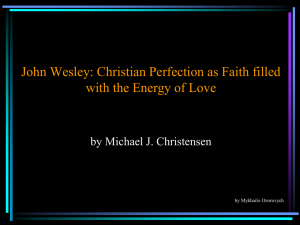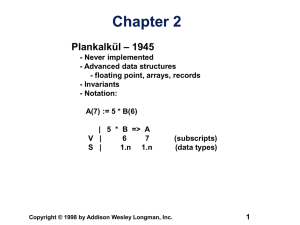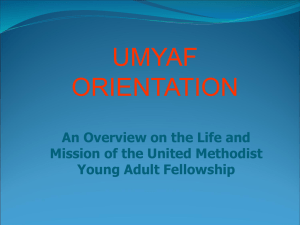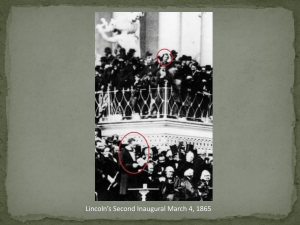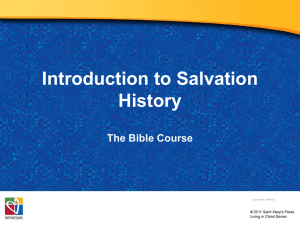Encounters with John Wesley
advertisement
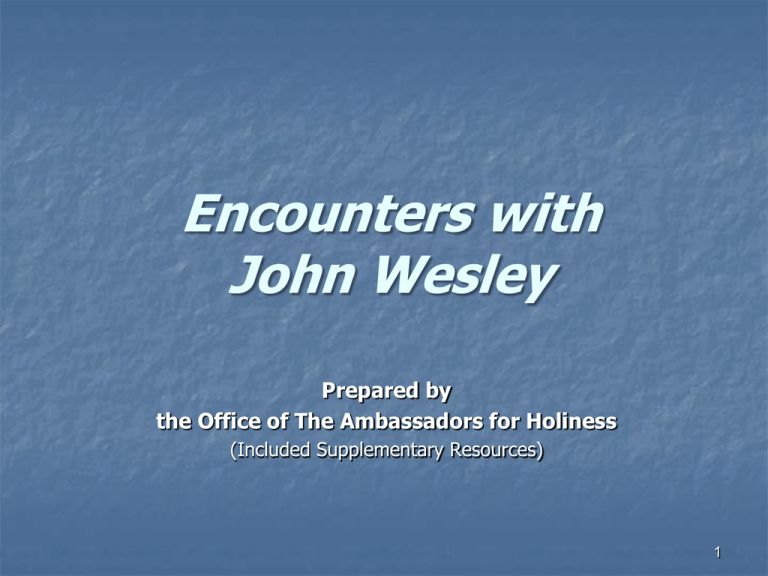
Encounters with John Wesley Prepared by the Office of The Ambassadors for Holiness (Included Supplementary Resources) 1 Who was John Wesley?: The Rediscovery of John Wesley (1) John Wesley (1703-1791) was one of the most influential figure in the Church history. In particular, “His life nearly spanned the eighteenth century. From the time he began ‘field preaching’ in 1739 until his death fifty-two years later he traveled some 225,000 miles and preached more than 40,000 times, sometimes to crowds of more than 20,000. At his death he left behind 72,000 Methodists in Great Britain and Ireland and a fledgling Methodist denomination in America of some 57,000 members.” According to C. E. Vulliamy, Wesley was the “ascendant personality” of his age, more widely known in Britain than any other Englishman of the time.” (Cf. Howard A. Snyder, The radical Wesley, pp. 3-5) 2 Who was John Wesley?: The Rediscovery of John Wesley (2) He was the great eighteenth-century … Practical theologian Revival preacher The Society-The Band (Moravian contribution)-The Class meeting (as cells for koinonia) Ref: D. Michael Henderson, A Model For Making Disciples. Religious Educational Innovator Ref: Skevington Wood, John Wesley-The Burning Heart Organizer Ref: Randy L. Maddox, “Reading Wesley as a theologian” (WTJ, Spring, 1995) Ref: Alfred H. Body, John Wesley and Education; Herbert W. Byrne, John Wesley and Learning. Social Reformer Wesley’s famous dictum-”the gospel of Christ knows no religion, but social; no holiness but social holiness.” Ref: Manfred Marquardt, John Wesley’s Social Ethics; Theodore W. Jennings, Good 3 News to the Poor; Theodore Runyon, ed. Sanctification and Liberation.) The Rediscovery of John Wesley (3a) as a great Christian apologetic theologian In recent years, John Wesley has been rediscovered as a great theologian. William Hordern, a Lutheran scholar, once said, “I was raised on the assertion that Wesley had no theology and that he taught a religion of experience alone, but it is now evident that Wesley was a powerful theologian.” (William Hordern, “Recent Trends in Systematic Theology” in Canadian Journal of Theology, vol. 3 [1961], p. 87) In The Rediscovery of John Wesley, George C. Cell contributed to the rediscovery of John Wesley as a theologian. Through his study, Cell points out that Wesley was reaffirming the main principles of the Reformer’s theology and had overcome the decline of Christianity which came under the influence of the Enlightenment. (George C. Cell, The Rediscovery of John Wesley, pp. 5-9) 4 The Rediscovery of John Wesley (3b) as a great Christian apologetic theologian It is true that “Wesley did not attempt to write a systematic theology…But perhaps this is Wesley’s strength, not his weakness. Theologians tend to admire other theologians who have neat and profound systems. Calvin’s theological reputation rests especially on his accomplishment study him, and a large literature on Calvinism exists. By contrast, Wesley has been considered a second-rate theologian. It has sufficed to say, ‘As a theologian, Wesley was a great revivalist!’ The literature on Wesley is primarily historical and biographical, rather than theological. Over 200 biographies or biographical studies on Wesley have come from the presses…For in Wesley theology and practice really were one. From the beginning, his theological work grappled with practical issues. His theology was shaped by his experience, and he most earnestly cared that his action be ground in sound doctrine.” (Cf. Howard A. Snyder, The radical Wesley, pp. 3-5) How do we see William and Catherine Booth in terms of recognizing them as great Christian thinkers in regards their influences as the co-founders of the Salvation Army to the churches as well as the world today? 5 The Purpose of Studying Wesley’s Theology 1. 2. As a Salvationist, we need to study John Wesley’s theology with special consideration to the following two facts: The Army’s distinctive theological heritage based on the Wesleyan tradition. William and Catherine Booth’s significant connection to Methodism and their own theological indebtedness to the Wesleyan tradition 6 1. The Army’s distinctive theological heritage based on the Wesleyan tradition. (1) The origin and status of the Army’s doctrine is stated in Salvation Story: “While their [Salvation Army Articles of Faith] origin is nowhere stated, their roots are clearly in the Wesleyan tradition. The articles bear a striking similarity in words and content to Methodist New Connexion doctrine, which can be traced back to at least 1838. William Booth was an ordained minister of the New Connexion, whose founders claimed their doctrine to be “those of Methodism, as taught by Mr. Wesley.” With the Movement’s birth in 1865, William Booth adopted seven articles of belief. Three more were added in 1870 and the last, now number ten, in 1876. Each additional point can be traced back to the New Connexion document… (Salvation Story [1998], pp. 130-131.) 7 1. The Army’s distinctive theological heritage based on the Wesleyan tradition. (2) Our doctrinal statement…then, derives from the teaching of John Wesley and the evangelical awakening of the eighteenth and nineteenth centuries. While there was significant correspondence between evangelicals in the mid-nineteenth century, indicated especially in the eight-point statement of the Evangelical Alliance of 1846, the distinctives of Salvation Army doctrine came from Methodism. Our strong emphasis on regeneration and sanctification, our conviction that the gospel is for the whosoever and our concern for humanity’s free will all find their roots there,” (Salvation Story [1998], pp. 130-131) 8 2. William and Catherine Booth’s connection to Methodism and their own theological indebtedness to the Wesleyan tradition (1) In his early teen years, William Booth (18291912) attended the local Broad Street Wesleyan Chapel. William’s initial conversion experience happened in these years while attending a prayer meeting under the influence of lay preacher Isaac Marsden. William Booth reaffirmed his personal experience of conversion at the age of fifteen, while attending the revival meetings led by the Rev. James Caughey (c. 1810-91, an American Methodist evangelist). William determined “’God should have all there was of him.’” Booth was Caughey’s heir. 9 2. William and Catherine Booth’s connection to Methodism and their own theological indebtedness to the Wesleyan tradition (2) William Booth had become an admirer of John Wesley by the age of twenty. He said of himself: “I worshipped everything that bore the name of Methodist. To me there was one God, and John Wesley was his prophet. I had devoured the story of his life. No human compositions seemed to me to be comparable to his writings, and to the hymns of his brother Charles, and all that was wanted, in my estimation, for the salvation of the world was the faithful carrying into practice of the letter and the spirit of his instructions.” (Frederick Booth-Tucker, The Life of Catherine Booth [1892], Vol. 1. p. 74 He entered Dr. William Cook’s training college for prospective New Connexion Methodist ministers on February 14, 1854. He joined and was ordained in the Methodist New Connexion (1797) in 1854-1862. Catherine Booth (1829-90) was significantly influenced by Phoebe Palmer (1807-74), an American Methodist lay revivalist. Catherine’s decision to preach and the Salvation Army’s female ministry can be traced to Phoebe Palmer. 10 Where to find Wesley’s Theology The main themes of Wesley’s theology are laced through his letters, diaries, and journal; his sermons and commentaries on the Bible; his books and pamphlets; and the collections of hymns that he and his brother Charles produced. Together these reveal a rich collection of insights about Christianity, Wesley’s personal life and activities, and the origin and development of the early Methodist movement and its mission. The most important of Wesley’s theological writings are his sermons, his Explanatory Notes Upon the New Testament, and the hymn books he published (A Collection of Hymns for the Use of the People Called Methodists [1780] – ‘a little body of experimental and practical divinity’). (Cf. Charles Yrigoyen, John Wesley: Holiness of Heart and Life, p. 24) The book of A Plain Account of Christian Perfection, as believed and taught by the Reverend Mr. John Wesley, from the year 1725, to the year 1777 – The main text for understanding Wesley’s central idea of Christian perfection. 11 Time Line of Events (1) 1688 1697 Samuel Wesley (1662-1735) marries Susanna Annesley (1669-1742) Samuel becomes Rector of Epworth 1707 Birth of Charles Wesley 1703 1709 1714 1720 1725 1726 1727-9 1728 1729 1734 Birth of John Wesley (*[1]-[5]) Second rectory fire – “Is not this a brand plucked out of the burning” (Zech. 3:2) John enters Charterhouse John begins studies at Christ Church, Oxford John ordained as deacon *[8] John elected Fellow of Lincoln College John serving as curate at Wroot John ordained priest Charles founds the ‘Holy Club’; John returns to Oxford John declines Epworth living 12 Time Line of Events (2) 1735 Death of Samuel Wesley *[6]; the Wesley’s leave for Georgia – “the hope of saving my own soul. I hope to learn the true sense of the gospel of Christ by preaching it to the heathen” (Wesley) 1735 (Oct) Charles’ ordination; the brothers set sail 1735 (Dec) The storm incident *[21] 1736 (Feb) The Wesleys arrive at Savannah *[22] 1737 (Dec) John leaves Savannah *[24] 1738 (Feb) John arrives back in England; he and Charles meet Peter Bohler 1738 (May) The Wesleys’ conversion experiences *[27] 1738 (Sept) John Wesley returns from his visit to Germany *[10] 1739 John Wesley preaches in the open air at Bristol *[38] First Methodist Society meets in Bristol 13 Time Line of Events (3) 1742 1744 1748 1749 1770 1776 1783 1784 (Feb) (Sept) 1788 1791 (Feb) Classes begin to be formed First meeting of Conference *[39] First Quarterly Meeting Kingswood School opens The Christian Library begins to appear Death of George Whitefield (b. 1714) American Declaration of Independence End of the war with the American colonies Deed of Declaration The ordination for America John Wesley’s revision of the Prayer Book Death of Charles Wesley Death of John Wesley 14 Primary sources for Understanding the Context of Wesley’s Life and Theology Cited from The Making of Methodism (Epworth Press, 1995) by Barrie Tabraham 15 Society [1] In most other societies, society presents hardly anything but a void between an ignorant labouring population and a need and profligate nobility….But with us the space between the ploughman and the peer is crammed with circle after circle, fitted in the most admirable manner for sitting upon each other, for connecting the former to the latter, and for rendering the whole prefect in cohesion, strength and beauty. (Source: Roy Porter, English Society in the Eighteenth Century, Penguin 1982, p.64) 16 Society [2] ….persons born in the field, generally near the brick-kilns round London … They grow up without learning to read or write, and never hear the words ‘Religion’ or ‘Belief’, and not even the word ‘God’, excepting the phrase ‘God damn it’. They gain their livelihood by all kinds of work in the brick-kilns, helping the drivers of hackney coaches, and so forth, until the old Adam in them is aroused: then they take to stealing and are generally hanged between the ages of 18 and 26. A short life and a merry one is their motto, which they do not hesitate to proclaim in court. (Source: Roy Porter, op.cit., p. 111) 17 Society [3] The small farmer is forced to be laborious to an extreme degree; he works harder and fares harder than the common labourer; and yet with all his labour and with all his fatiguing incessant exertions, seldom can he at all improve his conditions or even with any degree of regularity pay his rent and preserve his present situation. He is confined to perpetual drudgery, which is the source of profound ignorance, the parent of obstinacy and blind perseverance in old modes and old practices, however, absurd and pernicious. (Source: Roy Porter, op.cit., p. 84.) 18 The realm of thought [4] The sceptic is another enemy of religion, who naturally provokes the indignation of all divines and graver philosophers … This begets a very natural question. What is meant by a sceptic? And how far is it possible to push these philosophical principles of doubt and uncertainty? …. to have recourse to the veracity of the Supreme Being in order to prove the veracity of our senses is surely making a very unexpected circuit. If his veracity were at all concerned because it is not possible that he can ever deceive. Not to mention that, if the external world be once called into question, we shall be at a loss to find arguments by which we may prove the existence of that Being, or any of his attributes. This is a topic, therefore, in which the profounder and more philosophical sceptics will always triumph when they endeavour to introduce a universal doubt into all subjects of human knowledge and inquiry. (Source: David Hume, An Inquiry Concerning Human Understanding, Ch. XII ) 19 Religion [5] An act for preserving the protestant religion, by better securing the Church of England, as by law established; and for confirming the toleration granted to protestant dissenters by an act, intituled, An act for exempting their Majesties’ protestant subjects, dissenting from the Church of England, from the penalties of certain laws, and for supplying the defects thereof ….. And whereas it is or may be doubted whether a preacher or teacher or any congregation of dissenting protestants, duly in all respects qualified according to the said act, be allowed … to officiate in any congregation in an country, other than that in which he so qualified himself, although in a congregation or place of meeting duly certified and registered as is required by the said act; Be it … enacted … that any such preacher or teacher, so duly qualified … is hereby allowed to officiate in any congregation … provided that the said congregation, or place of meeting, hath been before such officiating duly … registered … and such preacher or teacher shall, if required, produce a certificated of his having so qualified himself, under the hand of the clerk of the peace for the county or place where he so qualified himself… (Source: E. N. Williams, The Eighteenth Century Constitution, CUP 1960, pp. 334-336) 20 [6] My father did not die unacquainted with the faith of the gospel, of the primitive Christians, or of our first Reformers; the same whish, by the grace of God, I preach, and which is just as new as Christianity. What he experienced before, I know not; but I know that during his last illness, which continued eight months, he enjoyed a clear sense of his acceptance with God. I heard him express it more than once, although at that time I understood him not. ‘The inward witness, son, the inward witness,’ said he to me, ‘that is the proof, the strongest proof, of Christianity.’ And when I asked him (the time of his change drawing nigh), ‘Sir, are you in much pain?’ he answered aloud, with a smile, ‘God does chasten me with pain – yea, all my bones with strong pain; but I thank Him for all, I bless Him for all, I love Him for all!’ I think the last words he spoke, when I had just commended his soul to God, were, ‘Now you have done all.’ And, with the same serene, cheerful countenance, he fell asleep, with out on struggle or sigh or groan. I cannot therefore doubt but the Spirit of God bore an inward witness with his spirit that he was a child of God. (Source: J. Wesley, Letters, Vol. 2, pp. 134-135. 3) 21 [8] In the year 1725, being in the twenty-third year of my age, I met with Bishop Taylor’s Rules and Exercises of Holy Living and Dying. In reading several parts of this book I was exceedingly affected, by that part in particular which related to ‘purity of intention’. Instantly I resolved to dedicate all my life to God, all my thoughts and words and actions, being thoroughly convinced there was no medium, but that every part of my life (not some only) must either be a sacrifice to God, or to myself; that is, in effect, to the devil…. In the year 1726 I met with Kempis’s Christian Pattern. The nature and extent of inward religion, the religion of the heart, now appeared to me in a stronger light that ever it had done before. I saw that giving even all my life to God (supposing it possible to do this and go no further) would profit me nothing unless I gave my heart, yea all my heart to Him. I saw that ‘simplicity of intention and purity of affection’, one design in all we speak or do and one desire ruling all our tempers, are, indeed, ‘the wings of the soul’, without which she can never ascend to the mount of God. A year or two after, Mr. Law’s Christian Perfection and Serious Call were put into my hands. These convinced me more than ever of the absolute impossibility of being half a Christian, and I determined, through His grace (the absolute necessity of which I was deeply sensible of) to be all-devoted to God: to give Him all my soul, my body and my substance. (Source: J. Wesley, Works (ed. Thomas Jackson). London 1872, Vol. VIII, pp. 366367.) 22 [10] …. I grew acquainted with the Mystic writers, whose noble descriptions of union with God and internal religion made everything else appear mean, flat and insipid. But, in truth, they made good works appear so, too; yea, and faith itself, and what not? These gave me an entire new view of religion – nothing like any I had before. But, alas! It was nothing like that religion which Christ and His apostles lived and taught. I had a plenary dispensation from all the commands of God. The form ran thus: ‘Love is all; all the commands besides are only means of love; you must choose those which you feel are means to you and use them as long as they are so.’ Thus were all the bands burst at once. And through I could never fully come into this, nor contentedly omit what God enjoined, yet, I know not how, I fluctuated between obedience and disobedience. I had no heart, no vigour, no zeal in obeying; continually doubting whether I was right or wrong and never out of perplexities and entanglements. Nor can I at this hour give a distinct account how or when I came a little back toward the right way. Only, my present state is this; all the other enemies of Christianity are triflers – the Mystics are the most dangerous of its enemies. They stab it in the vitals, and its most serious professors are most likely to fall by them May I praise Him who hath snatched me out of this fire likewise, by warning all others that it is set on fire of hell. (Source: J. Wesley, Journal, Vol. I, p. 420: 24 January 1738. 9) 23 [21] At seven I went to the Germans. I had long before observed the great seriousness of their behavior. Of their humility they had given continued proof, by performing those servile offices for the other passengers, which none of the English would undertake; for which they desired, and would receive no pay, saying, ‘it was good for their proud hearts’, and ‘their loving Saviour had done more for them.’ And every day had given them occasion of showing a meekness which no injury could move. If they were pushed, struck, or thrown down, they rose again and went away; but no complaint was found in their mouth. There was now an opportunity of trying whether they were delivered from the spirit of fear, as well as from that of pride, anger, and revenge. In the midst of the psalm wherewith their service began, the sea broke over, split the mainsail in pieces, covered the ship, and poured in between the decks, as if the great deep had already swallowed us up. A terrible screaming began among the English. The Germans calmly sung on. I asked one of them afterwards, ‘Was you not afraid?’ He answered, ‘I thank God, no.’ I asked, ‘But were not your women and children afraid?’ He replied mildly, ‘No; our women and children are not afraid to die.’ (Source: J. Wesley, Journal, 25 January 1736) 24 [22] Mr Oglethorpe returned from Savannah with Mr Spangenberg, one of the pastors of the Germans. I soon found what spirit he was of; and asked his advice with regard to my own conduct. He said, ‘My brother, I must first ask you one or two questions. Have you the witness within yourself? Does the Spirit of God bear witness with your spirit, that you are a child of God? I was surprised, and knew not what to answer. He observed it, and asked, ‘Do you know Jesus Christ?’ I paused, and said, ‘I know He is the Saviour of the world.’ ‘True,’ replied he; ‘but do you know He has saved you?’ I answered, ‘I hope He has died to save me.’ He only added, ‘Do you know yourself?’ I said, ‘I do.’ But I fear that they were vain words. (Source: J. Wesley, Journal, 7 February 1736) 25 [24] It is now two years and almost four months since I left my native country, in order to teach the Georgian Indians the nature of Christianity: but what have I learned myself in the meantime? Why (what I the least of all suspected), that I who went to America to convert others, was never myself converted to God. ‘I am not mad,’ though I thus speak, but ‘I speak the words of truth and soberness’ … If it be said that I have faith (for many such things have I heard, from many miserable comforters), I answer, So have the devils, - a sort of faith; but still they are strangers to the covenant of promise. So the apostles had even at Cana in Galilee, when Jesus first ‘manifested forth His glory’; even then they, in a sort, ‘believed on Him’; but they had not then ‘the faith that overcometh the world.’ The faith I want is, ‘A sure trust and confidence in God, that, through the merits of Christ, my sins are forgiven, and I reconciled to the favour of God’ … ‘I. I am not sure of this.’ Wesley’s own footnote, added later. ‘2. The faith of a son.’ – Ditto. (Source: J. Wesley, Journal, 29 February 1738) 26 [27] In the evening I went very unwillingly to a society in Aldersgate Street, where one was reading Luther’s preface to the Epistle to the Romans. About a quarter before nine, while he was describing the change which God works in the heart thought faith in Christ, I felt my heart strangely warmed. I felt I did trust in Christ, Christ alone, for salvation; and an assurance was given me, that He had taken away my sins, even mine, and saved me from the law of sin and death. I began to pray with all my might for those who had in a more especial manner despitefully used me and persecuted me. I then testified openly to all there, what I now first felt in my heart. But it was not long before the enemy suggested, ‘This cannot be faith; for where is the joy?’ Then was I taught, that peace and victory over sin are essential to faith in the Captain of our salvation; but that, as to the transports of joy that usually attended the beginning of it, especially in those who have mourned deeply, God sometimes giveth, sometimes withholdeth them, according to the counsels of His own will. After my return home, I was much buffeted with temptations; but cried out, and they fled away. They returned again and again. I as often lifted up my eyes, and He ‘sent me help from His holy place’. And herein I found the difference between this and my former state chiefly consisted. I was striving, yea, fighting with all my might under the law, as well as under grace. But then I was sometimes, if not often, conquered; now I was always conqueror. (Source: J. Wesley, Journal, Wednesday 24 May 1738) 27 [38] In the evening I reached Bristol, and met Mr. Whitefield there. I could scarce reconcile myself at first to this strange way of preaching in the fields, of which he set me an example on Sunday; having been all my life (till very lately) so tenacious of every point relating to decency and order, that I should have thought the saving of souls almost a sin, if it had not been done in a church. Sun. April I. - In the evening (Mr Whitefield being gone) I begun expounding our Lord’s Sermon on the Mount (one pretty remarkable precedent of field-preaching, though I suppose there were churches at that time also), to a little society which was accustomed to meet once or twice a week in Nicholas Street. Mon. 2 – At four in the afternoon, I submitted to be more vile, and proclaimed in the highways the glad tidings of salvation, speaking from a little eminence in a ground adjoining to the city, to about three thousand people…. (Source: J. Wesley, Journal, 31 March – 2 April 1739) 28 [39] Q.3. What are the Rules of an Assistant? A.1. Be diligent. Never be unemployed a moment, never be employed, never while away time; spend no more time at any place than is strictly necessary. 2. Be serious. Let your motto be, ‘holiness unto the Lord’. Avoid all lightness as you would avoid hell-fire, and laughing as you would cursing and swearing 3. Touch no woman. Be as loving as you will but hold your hands off’em. Custom is nothing to us. 4. Believe evil of no one. If you see I done, well. Else take heed how you credit it. Put the best construction on every thing. You know the judge is always supposed to be on the prisoner’s side. 5. Speak evil of no one, else your word especially would eat as doth as canker. Keep your thoughts within your own breast till you come to the person concerned. 6. Tell everyone what you think wrong in him and that plainly and as soon as may be; else it will fester in your heart. Make all haste, therefore, to cast the fire out of your bosom. triflingly 29 [39] 7. Do nothing ‘as a gentleman’. You have no more to do with this character than with that of a dancing-master. You are the servant of all; therefore, 8. Be ashamed of nothing but sin; not of fetching wood or drawing water, if time permits; not of cleaning your own shoes or your neighbour’s. 9. Take no money of any one. If they give you food when you are hungry or clothes when you need them, it is good. But not silver or gold. Let there be no pretence to say we grow rich by the gospel. 10. Contract no debt without my knowledge. 30 [39] 11. Be punctual: do everything exactly at the time. And, in general, do not mend our rules but keep them, not for wrath but for conscience’ sake. 12. Act in all things not according to your own will but as a son in the gospel. As such, it is your part to employ your time in the manner which we direct: partly in visiting the flock from house to house (the sick in particular); partly, in such a course of reading, meditation and prayer as we advise from time to time. Above all, if you labour with us in the Lord’s vineyard, it is needful you should do that part of the work which we direct, at those times and places which we judge most for his glory. (Source: Minutes of First Annual Conference, Friday 29 June 1744) 31
